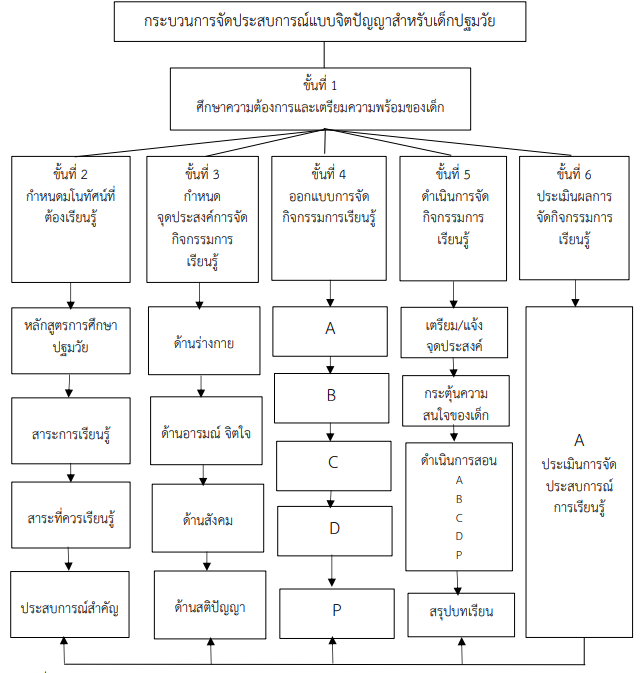ผลการพัฒนาความสามารถในการคิดแก้ปัญหาโดยใช้กิจกรรมแบบจิตปัญญาของ นักเรียนชั้นอนุบาลปีที่ 2
Main Article Content
บทคัดย่อ
การวิจัยครั้งนี้มีวัตถุประสงค์เพื่อศึกษาผลการพัฒนาความสามารถในการคิดแก้ปัญหาโดยใช้กิจกรรมแบบจิตปัญญาของนักเรียนชั้นอนุบาลปีที่ 2 กลุ่มเป้าหมาย ได้แก่ นักเรียนชั้นอนุบาลปีที่ 2 อายุ 4- 5 ปี ที่กำลังเรียนในภาคเรียนที่ 1 โรงเรียนบ้านหนองกุงวิทยาคาร สำนักงานเขตพื้นที่การศึกษาขอนแก่น เขต 1
จำนวน 15 คน ได้มาโดยการเลือกแบบเจาะจง เครื่องมือที่ใช้ในการเก็บรวบรวมข้อมูล ได้แก่ แผนการจัดกิจกรรมแบบจิตปัญญา แบบสังเกตพฤติกรรมความสามารถในการคิดแก้ปัญหา และแบบทดสอบวัดความสามารถในการคิดแก้ปัญหา วิเคราะห์ข้อมูลโดยใช้โปรแกรมคอมพิวเตอร์สำเร็จรูป สถิติที่ใช้ในการ
วิเคราะห์ข้อมูล ได้แก่ ค่าร้อยละ ค่าเฉลี่ย และค่าส่วนเบี่ยงเบนมาตรฐาน ผลการวิจัย พบว่า ความสามารถในการคิดแก้ปัญหาระหว่างก่อนการจัดกิจกรรมกับหลังการจัดกิจกรรมแบบจิตปัญญาเพิ่มสูงขึ้น โดยความสามารถในการคิดแก้ปัญหาของนักเรียนชั้นอนุบาลปีที่ 2 ก่อนได้รับการจัดกิจกรรมแบบจิตปัญญามีการ
เปลี่ยนแปลงบ้างเล็กน้อย ในระหว่างการจัดกิจกรรมแบบจิตปัญญา 8 สัปดาห์ มีแนวโน้มการเปลี่ยนแปลงเพิ่มสูงขึ้น และความสามารถในการคิดแก้ปัญหาของนักเรียนกลุ่มเป้าหมายหลังการจัดกิจกรรมแบบจิตปัญญาเพิ่มขึ้น ตามลำดับ แสดงให้เห็นว่าการจัดกิจกรรมแบบจิตปัญญาช่วยให้ความสามารถในการคิดแก้ปัญหาของนักเรียนชั้นอนุบาลปีที่ 2 เพิ่มสูงขึ้น
Article Details
เอกสารอ้างอิง
กุลยา ตันติผลาผลชีวะ. (2543). การสอนแบบจิตปัญญา: แนวการใช้ในการสร้างแผนการสอนระดับอนุบาลศึกษา. กรุงเทพฯ: เอดิสัน เพรสโปรดักส์.
กุลยา ตันติผลาผลชีวะ. (2551). การจัดกิจกรรมการเรียนรู้สำหรับเด็กปฐมวัย. กรุงเทพฯ: เบรน-เบส บุ๊คส์.
ทิศนา แขมณี และคณะ. (2536). หลักการและรูปแบบการพัฒนาเด็กปฐมวัยตามวิถีชีวิตไทย. กรุงเทพฯ: จุฬาลงกรณ์มหาวิทยาลัย.
เบญจวรรณ สายโยค และสิทธิพล อาจอินทร์. (2557). การศึกษาความสามารถในการคิดแก้ปัญหาและความมีวินัยในตนเองของเด็กปฐมวัย โดยการจัดประสบการณ์แบบใช้ปัญหาเป็นฐาน. วารสารศึกษาศาสตร์ฉบับวิจัยบัณฑิตศึกษา มหาวิทยาลัยขอนแก่น, 8(4), 81-89.
เยาวนารถ เลาหบรรจง. (2545). ผลการวิจัยกิจกรรมการสอนบแบบจิตปัญญาที่มีต่อความภาคภูมิใจในตนเองของเด็กปฐมวัย. ปริญญานิพนธ์การศึกษามหาบัณฑิต สาขาวิชาการศึกษาปฐมวัย มหาวิทยาลัยศรีนครินทรวิโรฒ.
ลดาวรรณ ดีสม. (2546).การพัฒนาทักษะพื้นฐานทางวิทยาศาสตร์ของเด็กปฐมวัยใช้กิจกรรมการเรียนแบบต่อภาพ. ปริญญานิพนธ์การศึกษามหาบัณฑิต สาขาวิชาการศึกษาปฐมวัย มหาวิทยาลัยศรีนครินทรวิโรฒ.
วัฒนา มัคคสมัน. (2539). การพัฒนารูปแบบการเรียนการสอนตามหลักการสอนแบบโครงการเพื่อเสริมสร้างการเห็นคุณค่าในตนเองของเด็กอนุบาล. วิทยานิพนธ์ครุศาสตรมหาบัณฑิต สาขาวิชาการศึกษาปฐมวัย จุฬาลงกรณ์มหาวิทยาลัย.
สิริรัตน์ นาคิน. (2564). การจัดการเรียนรู้จิตตปัญญาศึกษา. กรุงเทพฯ: ซียูเพรส.
สิริรัตน์ นาคิน. (2564). การบริหารการจัดการเรียนรู้ตามแนวจิตตปัญญาศึกษา. ใน ชุดวิชา 23728 นวัตกรรมการบริหารการศึกษาและภาวะผู้นำ. นนทบุรี: มหาวิทยาลัยสุโขทัยธรรมาธิราช.
Edmonds, W, A., and Kennedy, T, D. (2017). An Applied Guide to Research Designs: Quantitative, Qualitative, and Mixed Methods. California: Sage


